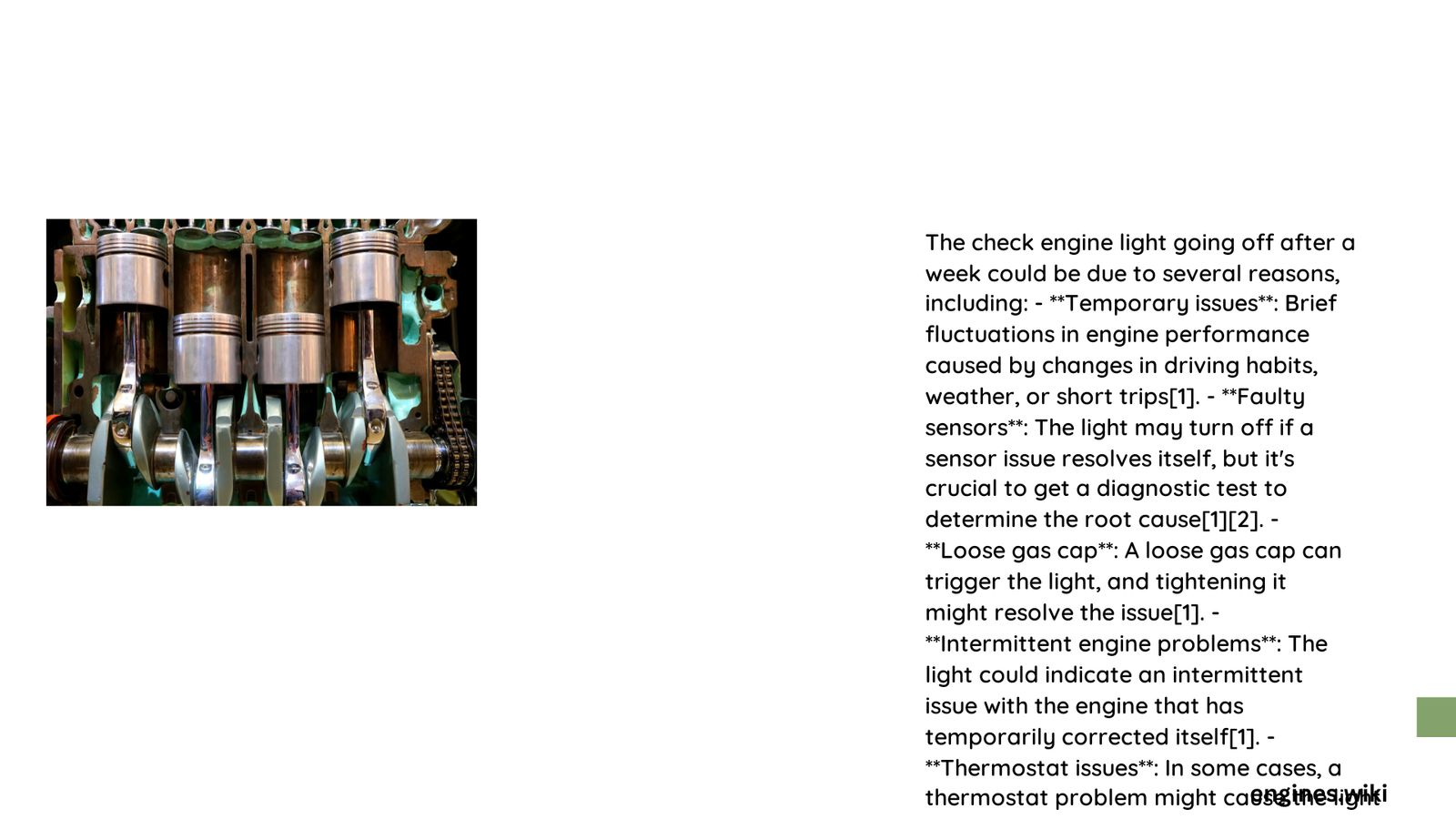When your check engine light mysteriously goes off after a week, it can signal various scenarios ranging from minor temporary issues to potential underlying vehicle problems. This phenomenon often leaves car owners puzzled and uncertain about their next steps. Understanding the potential reasons behind this occurrence can help you make informed decisions about your vehicle’s health and prevent potential future complications.
What Causes Check Engine Light to Disappear After a Week?
Can Temporary Sensor Malfunctions Resolve Themselves?
Sometimes, vehicle sensors experience momentary glitches that can trigger the check engine light. These temporary malfunctions might resolve without direct intervention:
- Oxygen Sensor Fluctuations
- Intermittent readings
- Sensor recalibration
-
Environmental temperature changes
-
Mass Airflow Sensor Inconsistencies
- Dust or debris interference
- Electrical signal variations
- Temporary calibration issues
Why Might a Loose Gas Cap Trigger and Then Deactivate the Warning?
A loose or improperly sealed gas cap is a common culprit for check engine light activation. When the cap is slightly loose, it can:
| Issue | Potential Impact | Resolution |
|---|---|---|
| Fuel System Pressure | Slight pressure drop | Tightening cap |
| Evaporative Emissions System | Minor leakage | Self-correction |
| Sensor Trigger | False warning | Automatic reset |
How Do Rare Engine Misfires Affect the Check Engine Light?
Occasional engine misfires can momentarily activate the warning light. These misfires might occur due to:
- Spark plug inconsistencies
- Temporary fuel delivery interruptions
- Minor electrical system fluctuations
What Diagnostic Steps Should You Take?
Use an OBD-II Scanner
- Connect the scanner to your vehicle’s diagnostic port
- Retrieve error codes
- Analyze the specific diagnostic trouble codes (DTCs)
- Clear codes if the issue seems resolved
Perform Visual Inspections
- Check gas cap seal and tightness
- Examine spark plug connections
- Inspect wiring harnesses
- Look for visible sensor damage
When Should You Seek Professional Help?
While some check engine light issues resolve independently, certain scenarios warrant professional intervention:
- Persistent warning light reappearance
- Multiple error codes
- Performance degradation
- Unusual vehicle behavior
Key Takeaways

- Not all check engine light activations indicate severe problems
- Temporary sensor issues can cause self-resolving warnings
- Regular vehicle maintenance prevents potential complications
- Professional diagnostics provide comprehensive insights
Expert Recommendations
- Don’t ignore recurring check engine light episodes
- Maintain a log of warning light occurrences
- Invest in a reliable OBD-II scanner
- Schedule regular vehicle health check-ups
Cost Considerations
| Diagnostic Method | Estimated Cost | Time Investment |
|---|---|---|
| DIY OBD-II Scanner | $20 – $100 | 15-60 minutes |
| Professional Mechanic | $75 – $150/hour | 1-3 hours |
Final Thoughts
A check engine light that goes off after a week isn’t always a cause for alarm. However, staying proactive and understanding potential underlying issues can save you time, money, and prevent potential long-term vehicle damage.
